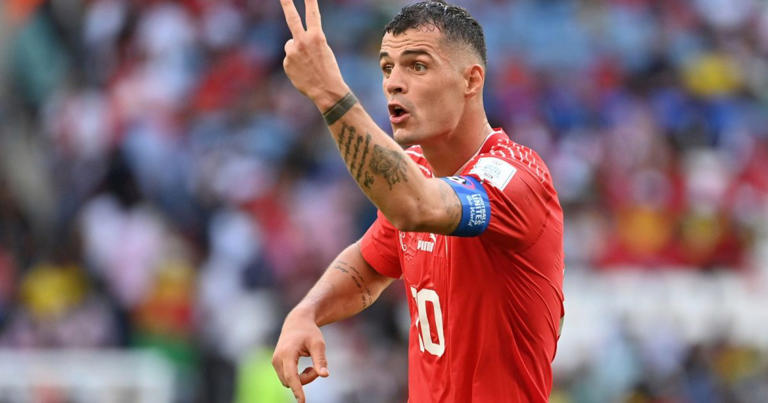Granit Xhaka: Switzerland’s calming influence and great hope for an impressive Euros
Granit Xhaka took to the stage at Euro 2024 in the heart of enemy territory. In Cologne, he was never likely to be popular as a linchpin in local rivals Bayer Leverkusen’s first ever Bundesliga title triumph, while the locals had seen their club relegated.
And yet, in their opening victory of Group A against a formidable Hungary side, he looked suitably comfortable for the most part.
Kwadwo Duah’s first international goal at the age of 27, Michiel Aebischer making history as the first Swiss player to score and assist in a Euros game and Breel Embolo’s late strike on his international return from injury hell will take the headlines. But without Xhaka’s composure, intelligence and quick passing, those moments, and Switzerland’s result, could have looked quite different.
Murat Yakin opting for the same 3-4-3 system which Xabi Alonso utilised to get the most from Xhaka domestically was a masterstroke. Solidity in the middle gave him freedom to effect the game high up the pitch and provide a link between defence and attack, and the steadfast discipline of his partner Remo Freuler, who spent last season helping Bologna into the Champions League alongside Aebischer while on loan from Nottingham Forest, helped him shine brighter.
Related video: Fans from Hungary and Switzerland are warming up for their teams’ first match at Euro 2024 (Reuters)
Loaded: 3.74%Pause
Current Time 0:04
/
Duration 2:40Quality SettingsSubtitlesFullscreen

Fans from Hungary and Switzerland are warming up for their teams’ first match at Euro 2024Unmute
0
Hungary simply couldn’t handle Xhaka’s forward runs, or the sumptuous weight of his passes in a first half Switzerland; he deserves huge credit for calming down. He is not the same hot-head from his Arsenal days.
This is a Switzerland side that is coming to the end of its lifespan. Xhaka and Ricardo Rodriguez are 31 years of age, Freuler is 32, as is Newcastle defender Fabian Schar. There is a sense of now or never for this group of tournament regulars who are yet to make a serious mark at a tournament.
But their patience in possession and understanding of how to keep Hungary at arm’s length was perhaps the strongest sign yet that this team is mature enough to finally cause some problem
Half way through the second half when Barnabas Varga pulled a goal back with a backpost header, moments after missing from an identical position, Hungary wrestled control. It had been building since the breal. But still Xhaka was like a magnet to the ball, always seemingly stood in yards of space. He wasn’t panicking.
That swing in momentum only served as further evidence of the strength of Switzerland’s approach. Hungary had found a way to force them inside and shackle them; Dan Ndoye, Switzerland’s other Bologna star, was not as lively as in the first half. Hungary found their zip, but there was the lesson for the Scotland game on Wednesday. Stretch the pitch and create as much space for Xhaka as possible, and they should have enough to secure a second win and progression to the last 16.
Tough moments are learning moments; Switzerland showed great strength to weather the Hungary storm as the second half wore on. They were calm and level-headed, all stemming from Xhaka. He and the team have both benefited from this less chaotic, hot-headed approach.

